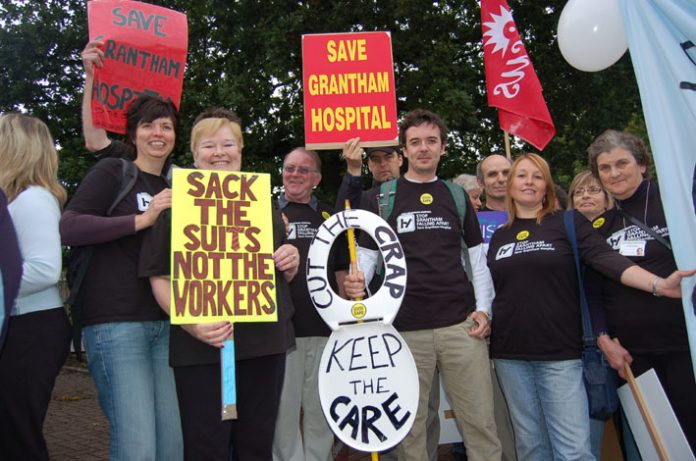
NO TO PRIVATISATION!
SAVE OUR DISTRICT GENERAL HOSPITALS!
BLAIR AND BROWN OUT!
THE Blair government is gunning for District General Hospitals – David Nicholson, the Chief Executive of the National Health Service (NHS), has said that 60 hospitals must be ‘reconfigured’, that is down-sized to non-acute facilities, or closed.
This comes after a year and half of battering by funding cuts. On the excuse of mismanagement and ‘deficits’, millions of pounds worth of cuts have been meted out to District General Hospitals (DGHs), community hospitals and mental health facilities.
Thousands of beds have closed, 20,000 posts have gone and hundreds of staff have lost their jobs.
The DGH is one of the greatest gains of the NHS.
In the DGH all aspects of a patient’s care are addressed comprehensively to a high standard by consultant-led care.
The DGH also doubles as a huge school for the training of student and junior doctors, nurses and paramedics.
Patients know the value of their local DGH. All over the country patients are marching and organising to defend their services.
Every single acute DGH must be kept open.
Removing Accident and Emergency departments, Paediatrics and Maternity, and then Acute Surgery and Trauma. spells the end of the DGH as an integrated whole, with training facilities.
Patients will then have to travel for miles to get proper consultant-led care.
The government’s White Paper (January 06), ‘Our Health, Our Care, Our Say’, proposes shifting £4bn of funding per annum out of NHS hospitals into so-called ‘Community Care’ instead.
This consists of:
1. New polyclinics provided by private corporations, doing the non-acute work – Out Patients, Day Surgery, Diagnostics, and Convalescence.
These will be stripped out of the local DGH and provided for profit.
2. The undermining of traditional General Practitioners – of which there is a desperate need – and their replacement with new primary health centres provided by large corporations like United Health, as happened in Creswell Derbyshire. These will take the capitation fees and use their position as Practice-Based Commissioners to refer patients to their own Secondary Care facilities, such as Independent Sector Treatment Centres (ISTCs).
3 Elderly and complex patients, are to be denied expensive hospital treatment, and will be left at home to care for themselves with some nurse or emergency care practitioner input.
We have seen ‘Community Care’ before. Margaret Thatcher’s Tory government closed down the asylums in favour of Care in the Community, leaving thousands of mentally-disturbed patients with nowhere to go, many ending up in prison.
Prime Minister Tony Blair is determined to stay in office to see through his NHS ‘reforms’.
Having adopted the Tory privatisation plans – such as the PFI (Private Finance Initiative) hospitals and the Purchaser-Provider split, through the introduction of Primary Care Trusts (PCTs) – Blair has invited in the private corporations to provide clinical services by introducing ISTCs.
Payments by Results (PBR), giving every procedure a tarriff price, was instituted to facilitate market competition amongst health providers.
The billions spent on electronic patient records was to assist the government diversion of NHS patients into a plurality of private providers, through ‘Choice’.
Competition would drive out the ‘least efficient’. The ISTCs cherry-picking the straightforward cases would drive up ‘productivity’ in NHS hospitals, or drive them out of business.
This is the scenario that Blair’s nine years in office and billions of pounds of extra spending (£37bn in 1997 to £80bn in 2006), was supposed to bring in.
Now the government is moving in for the kill with massive cuts and ‘reconfigurations’ by central diktat.
Health Secretary Patricia Hewitt has said there is to be no limit on privatisation.
Blair has promised that the NHS will no longer be a provider of clinical services, just a commissioner.
PCTs are being pressurised by government to out-source their commissioning functions to private companies.
Labour wants the 80 per cent of the NHS budget that is used for commissioning to be in the hands of private corporations. Then they will commission services from themselves.
Chancellor Gordon Brown has the same policy, dressed up as a new proposal of an ‘independent board’. This would be stuffed with financiers and private health company representatives.
The banks and major corporations are desperate to get their hands on the £60bn of NHS commissioning money.
The DGH acts as a barrier to privatisation. So long as DGHs exist, patients will prefer to go to them.
Patients know the difference between hospital care and ‘Community Care’.
That is why they are marching and organising to defend their local DGHs and keep them open.
Today is the first time all the health unions have come together under the auspices of the Trades Union Congress to organise a day of protest. It is a start, but it is not enough.
The public are out there fighting, but the union leaders are in the rear doing as little as possible.
In the face of the largest national privatisation yet of NHS facilities, NHS Logistics, UNISON, pressed by its members, called two one-day strikes at the 11th hour and then caved in to DHL and the government.
A resolution was proposed by UNISON at the Labour Party Conference, calling for a halt to privatisation, which was passed overwhelmingly.
The UNISON leaders refused to act on it and allowed NHS Logistics to be privatised just a few days later.
The time for words has long passed. There needs to be action. We need a new leadership in the unions.
Today’s mass lobby of parliament must be the prelude to national strike action by all trade unions to keep every single DGH open, to stop the funding cuts, and halt and reverse the privatisation ‘reforms’.